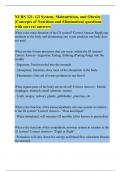NURS 321- GI System, Malnutrition, and Obesity
(Concepts of Nutrition and Elimination) questions
with correct answers
What is the main function of the GI system? Correct Answer-Supplying
nutrients to the body and eliminating any waste products our body does
not need
What are the 4 main processes that can occur within the GI system?
Correct Answer-- Ingestion: Eating, drinking (Putting things into the
mouth)
- Digestion: Food traveled into the stomach
- Absorption: Intestines does most of the absorption in the body
- Elimination: Gets rid of waste products in our bowel
What organs/parts of the body are involved? Correct Answer-- Mouth,
esophagus, stomach, small intestine, rectum
- Teeth, tongue, salivary glands, gallbladder, pancreas, etc.
What is the function of the parasympathetic nervous system in relation
to the GI system? Correct Answer-- "Rest and digest"
- When stimulated, will increase GI motility (Also known as peristalsis)
What is the function of the sympathetic nervous system in relation to the
GI system? Correct Answer-- "Fight or flight"
- Peristalsis will slow down b/c energy and blood flow elsewhere besides
the stomach
,What is the function of the enteric (intrinsic) nervous system? Correct
Answer-- Help intervate
- Help with movement and pressure for the function of the GI
What will happen to the circulation and blood flow If there is
trauma/stress on the body elsewhere besides the stomach? Correct
Answer-The larger area of blood flow from the stomach will be diverted
if blood flow is needed elsewhere
What are the age related changes to the GI system in older adults?
Correct Answer-- Everything slows down
- Decreased muscle tone: Think lower esophageal sphincter (LES) will
weaken making the older adult high risk for reflux, aspiration, and
aspiration pneumonia
- Decreased peristalsis
- Decreased blood flow
- Decreased taste buds
What are some examples of questions to ask during a comprehensive
health history of the GI? Correct Answer-- Last bowel movement
- What does the bowel look like
- Is there blood in the stool
- How often are there bowel movements
- N/V/C/D
- Weight change
, - Appetite change
- How is there oral health: See a dentist regularly, cavities, gum disease
What is included in the comprehensive health history of the GI during
the patient interview? Correct Answer-- Social habits: Smoking intake,
alcohol intake, drug use, activity level
- Health patterns/diets: Type of diet (Vegan, vegetarian, religious,
intermittent fasting, etc.) 24 hour diet recall to get a better understanding
of their typical eating habits
- Family history: Colon cancer, crohn's, diabetes, ulcerative colitis
- Past medical history: Tumors, hernia, cancer, autoimmune disease such
as crohn's or ulcerative colitis
- Surgical history: Bariatric surgery, hernia surgery
- Medication history (Most ca cause GI bleeds): NSAIDS, steroids, iron
(Constipation, GI upset), opioids (Constipation, hypoactive bowel
sounds), antibiotics (C Diff), laxatives, anticholinergics (Constipation,
decreased peristalsis, hypoactive bowel sounds), cholinergic (Increased
peristalsis, hyperactive bowel sounds)
What is the order of the physical assessment of the abdomen? Correct
Answer-- Inspect
- Auscultate
- Percussion
- Palpate
Why is the order different for the GI? Correct Answer-- If the patient is
having abdominal pain and you begin with palpating, you can cause the




